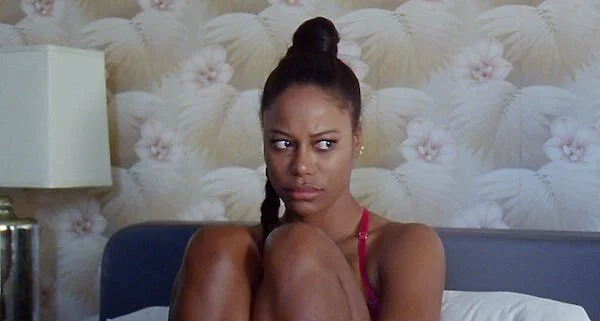Social media feeds and selfies are Zola’s lifeblood in Janicza Bravo’s bold sophomore feature, a larger-than-life tale about conflicting identities, sex work and race. There’s much to be gleaned from the refracted themes in this dizzying tale – Cameron Wolff is here to break down one of the most mesmerizing films of the year.
Mirrors and reflections populate almost every scene of Janicza Bravo’s sophomore feature film, from social media feeds to selfies, to the mirrors that decorate the walls of strip clubs. A quiet prelude to the chaos of the majority of Zola’s high-velocity runtime, Bravo’s film opens in a room of mirrors, wrapping around Detroit waitress-turned-dancer Zola (Taylour Paige) and Stefani (Riley Keough), a new friend turned business partner. With Mica Levi’s dreamy, hypnotic score filling the soundtrack, Bravo pans around the women applying makeup and fixing their hair. As Zola gets ready, Stefani copies her every gesture, styling her hair and makeup after Zola, molding herself into a white mirror. From the offset, Bravo illustrates the small ways that Black women’s lives are appropriated and consumed by others, compounding into a larger reflection of a parasitic culture of racial exploitation. Zola attempts to right this wrong by centering the protagonist’s life and words.
Throughout the course of the film, the eponymous heroine sees her culture appropriated and her labor exploited, her own life and agency as a sex worker brought into question by the ulterior motives of those around her. Picking up as she meets fellow stripper Stefani while working at a Hooters in Detroit, Zola embarks on a wild road trip to Florida with Stefani, her boyfriend Derrek (Nicholas Braun), and Stefani’s enigmatic roommate X (Colman Domingo). Hoping to earn more cash dancing in the Sunshine State, Zola finds herself in way over her head, experiencing the dangers of pimps, sex trafficking, and armed standoffs. Perhaps the most surprising twist of the zig-zagging tale is its veracity, taking its plot directly from the Twitter account of the real-life A’Ziah “Zola” King. While she admits to some fudging of facts for the sake of good storytelling, the true-life sources render the mind-boggling story even more unbelievable.
While Zola loses control of her own life onscreen, wrapped up in the machinations of others, the fact that King is telling her own story stands as a reclamation of sorts. After seeing her life commandeered by others in the film, including her culture and mannerisms aped by a white woman and her work controlled by others, Bravo ensures that King and her words are responsible for the story’s unfolding. The film even mocks other people’s attempts to tell what should be King’s story, depicting the real-life Stefani’s Reddit defense of her actions. Comically depicting Stefani as a devout Christian (“I fuck with Jesus,” she claims), Bravo highlights the absurdity of Stefani’s version of the events of Zola, full of blatant mischaracterization of Zola herself, clearly driven by racism and classism.
While Bravo brings dynamic and fluid visual storytelling to Zola’s life story, the script keeps a tight focus by following King’s original Twitter thread. Screenwriters Bravo and Jeremy O. Harris sneak in some of Zola’s own words, rooting the film in King’s compelling and idiosyncratic language. Why would anyone want to tamper with King’s writing anyway? Full of memorable one-liners (the film makes extensive use of the thread’s opening: “Y'all wanna hear a story about why me and this bitch here fell out? It's kind of long, but it's full of suspense”), the thread offers a masterclass in storytelling, defined by a clear voice and three-act plotting that would make any screenwriter jealous.
While King posted the thread that would become Zola in October 2015, the stranger-than-fiction tale feels both of its time and timeless. A Black bisexual woman and a sex worker, King is living in a world that refuses her a voice at every turn. Yet with Instagram and Twitter, anybody with internet access can have a voice now, and so the now-legendary thread could come from no other medium – because no other medium would have allowed King to tell her story in the first place.
Zola, while a film about an adventure gone awry, is also a film about sex work and workers. Giving the audience a glimpse into online sex work circa 2015, the film prominently features Backpage, a now-defunct classified advertising website widely used by sex workers at the time, as Zola uses it to arrange hookups between Stefani and various clients. In the aftermath of the website’s demise, another digital platform has risen among sex workers: the ubiquitous OnlyFans. Likely exacerbated by the COVID-19 pandemic, sex work has only increased in the digital sphere since the events of Zola. The themes of internet connectedness tied to the independence and exploitation of sex workers are still being played out today.
In the United States, the false conflation of consensual sex work with sex trafficking has only gained popularity since the publication of King’s Twitter thread, with bills like the Stop Enabling Sex Traffickers Act (SESTA) and the Allow States and Victims to Fight Online Sex Trafficking Act (FOSTA) being passed into federal law in 2018. Laws like SESTA and FOSTA, while well-meaning in their intent to curb sexual exploitation and abuse, actively take away the rights of those in the sex work industry by shutting down legitimate avenues of arranging work. While Zola’s plot prominently features sex trafficking and the exploitation of sex workers, the film avoids cautioning the audience in any way, nor does it exhibit judgement towards those doing sex work. This is especially evident when Zola realises the manipulative tactics of Stefani’s “roommate,” X. Working as Stefani’s pimp, X places listings on Backpage for Stefani for paltry pay. When Zola takes hold of Stefani’s listings, she realises her friend’s worth, upping her prices per client and improving the quality of her advertising. The duo bring in more money than X ever manages to arrange in a single night, King and Bravo illustrating what happens when sex work is in the hands of the workers themselves. Bravo’s memorable montage of Zola and Stefani’s night in business depicts independent sex work driven by the two women, equally lucrative and ethical.
In the film’s first act, we see Zola on the road with X, Stefani, and Derrek crossing state borders into Florida. Far from Detroit, Zola finds herself confronted with the startling image of a confederate flag, flying high and proud in the southern blue sky. She squirms in the backseat of X’s car, deep in unfriendly territory. Zola, with its endless digital screens and reflective mirrors and recording devices, takes an honest look at the real-life impact of our online engagements. The eponymous character spends the majority of the film being mediated by others both on the internet and in real life. But, Zola the film sees Zola King mediate herself, using the direct words of her Twitter thread to depict a life most will never experience. Bravo spends much of the film’s runtime filming Zola through the screens of others, in Stefani’s Instagram selfies and X’s Backpage ads, that it’s hard to know how she sees herself. After all the strip club mirrors and cell phone screens, in the end Zola depicts A’Ziah “Zola” King in her own words, allowing her agency in her own narrative and life.
Cameron Grace Wolff (@cgracewolff) is a Minneapolis-based writer with a passion for film, television, and queer media. She is a staff writer at The Young Folks, and her other writing can be found at The Gay Gaze, Film Daze, and Emily VanDerWerff's newsletter, Episodes.



